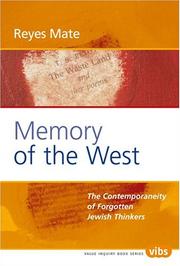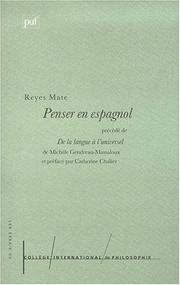| Listing 1 - 10 of 17 | << page >> |
Sort by
|
Book
ISBN: 9782914722773 291472277X Year: 2009 Publisher: Paris : Mix,
Abstract | Keywords | Export | Availability | Bookmark
 Loading...
Loading...Choose an application
- Reference Manager
- EndNote
- RefWorks (Direct export to RefWorks)
Walter Benjamin n’a pas voulu abandonner l’Europe alors que le fascisme le talonnait. Il devait regarder la barbarie en face pour lui arracher le secret de son pouvoir. Le résultat, il l’a laissé par écrit sur quelques feuillets intitulés « Sur le concept d’histoire » qui lui ont coûté la vie. Il disait qu’ils étaient « l’armature théorique » pour percer le XX° siècle. Benjamin est un des principaux philosophes de notre temps, plus souvent cité que lu ou compris. Le propos de Minuit dans l’histoire est de nous faire pénétrer dans chaque phrase de ses célèbres Thèses pour reconstruire cette armature théorique. La tâche ne va pas de soi étant donné le caractère fragmentaire de cet écrit et la proverbiale sobriété expressive de son auteur. «Que rien ne se perde», la consigne que lui-même donnait à l’historien instruit à son école, est le principe qui préside à cette lecture d’un des textes les plus lucides, radicaux et émouvants qui aient été écrits. Ces temps sombres n’invitaient qu’à organiser le pessimisme. Benjamin a averti que la logique de son temps menait à la catastrophe. Son génie a consisté à extraire des rebuts de l’histoire des matériaux avec lesquels construire un avenir qui ne soit pas prolongation du présent. Cette leçon reste en vigueur car la logique de l’histoire, malgré la catastrophe, est encore aujourd’hui la même.
Benjamin, Walter, --- Europe --- History --- Philosophy --- Histoire --- Philosophie --- Criticism --- Interpretation (Philosophy)
Book
ISBN: 1441665846 Year: 2005 Volume: 13 Publisher: Rubí, Barcelona : Anthropos,
Abstract | Keywords | Export | Availability | Bookmark
 Loading...
Loading...Choose an application
- Reference Manager
- EndNote
- RefWorks (Direct export to RefWorks)
Political culture --- Memory --- History --- Social aspects --- Spain --- Europe

ISBN: 9789004458765 9789042018235 Year: 2004 Publisher: Leiden; Boston : BRILL
Abstract | Keywords | Export | Availability | Bookmark
 Loading...
Loading...Choose an application
- Reference Manager
- EndNote
- RefWorks (Direct export to RefWorks)
This book looks back in order to look forward. It is a sustained reflection on the great disillusion Europe experienced after World War I. Europeans understood that bombs had buried the Enlightenment. They knew that, to avoid catastrophe, they had to think anew. The catastrophe came, but Cohen, Benjamin, Kafka, and Rosenzweig had sounded the warning.
Jewish philosophers --- Philosophy --- Philosophy, Modern --- History --- Benjamin, Walter, --- Cohen, Hermann, --- Kafka, Franz, --- Influence.
Book
ISBN: 8430106480 Year: 1975 Publisher: Salamanca Ediciones Sigueme
Abstract | Keywords | Export | Availability | Bookmark
 Loading...
Loading...Choose an application
- Reference Manager
- EndNote
- RefWorks (Direct export to RefWorks)
Book
ISBN: 8430105085 Year: 1973 Publisher: Salamanca Ediciones Sigueme
Abstract | Keywords | Export | Availability | Bookmark
 Loading...
Loading...Choose an application
- Reference Manager
- EndNote
- RefWorks (Direct export to RefWorks)
Book
ISBN: 3447034556 Year: 1994 Volume: 57 Publisher: Wiesbaden Harrassowitz
Abstract | Keywords | Export | Availability | Bookmark
 Loading...
Loading...Choose an application
- Reference Manager
- EndNote
- RefWorks (Direct export to RefWorks)
Political philosophy. Social philosophy --- political science --- anno 1600-1699 --- Spain --- Political science --- -Administration --- Civil government --- Commonwealth, The --- Government --- Political theory --- Political thought --- Politics --- Science, Political --- Social sciences --- State, The --- History --- -Congresses --- Civilization --- -Congresses. --- -History --- Espanja --- Spanien --- Hiszpania --- Spanish State --- España --- Estado Español --- Espagne --- Hispania --- Sefarad --- Sepharad --- Shpanye --- Shpanie --- Reino de España --- Kingdom of Spain --- Reino d'Espanya --- Reinu d'España --- Espainiako Erresuma --- Regne d'Espanya --- Reiaume d'Espanha --- Espanya --- Espanha --- スペイン --- Supein --- イスパニア --- Isupania --- Administration --- History&delete& --- Congresses --- Congresses. --- Philosophy [Spanish ]

Abstract | Keywords | Export | Availability | Bookmark
 Loading...
Loading...Choose an application
- Reference Manager
- EndNote
- RefWorks (Direct export to RefWorks)
Language --- Spanish language --- Sociolinguistics --- Langage --- Espagnol (Langue) --- Sociolinguistique --- Philosophy --- Philosophie --- Language and languages --- Castilian language --- Romance languages --- Mental philosophy --- Humanities --- Europe --- Spain --- Civilization --- Spanish influences. --- Linguistique espagnole
Book
ISBN: 9788495291448 8495291444 Year: 2016 Publisher: Segovia: La uÑa RoTa,
Abstract | Keywords | Export | Availability | Bookmark
 Loading...
Loading...Choose an application
- Reference Manager
- EndNote
- RefWorks (Direct export to RefWorks)
Book
Abstract | Keywords | Export | Availability | Bookmark
 Loading...
Loading...Choose an application
- Reference Manager
- EndNote
- RefWorks (Direct export to RefWorks)
Book
ISBN: 1441664564 Year: 2008 Publisher: [Place of publication not identified] Anthropos
Abstract | Keywords | Export | Availability | Bookmark
 Loading...
Loading...Choose an application
- Reference Manager
- EndNote
- RefWorks (Direct export to RefWorks)
| Listing 1 - 10 of 17 | << page >> |
Sort by
|

 Search
Search Feedback
Feedback About UniCat
About UniCat  Help
Help News
News